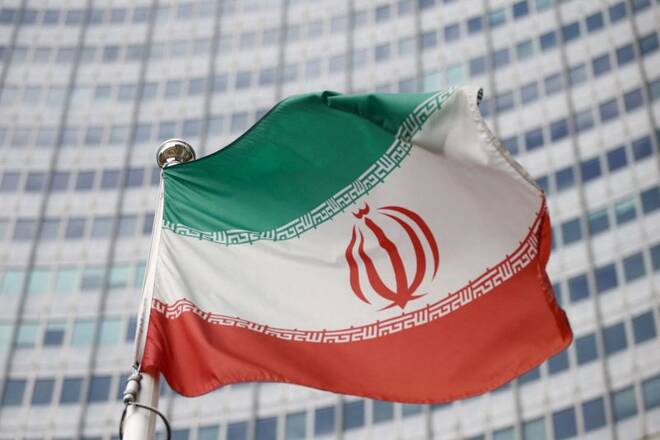Advertisement
Advertisement
Iran says key issues still unresolved in nuclear talks
By:
(Reuters) - Iran said on Monday that reviving a 2015 nuclear deal is possible if Western powers take a political decision to resolve three key remaining issues, as the talks between Tehran and global powers enter a crucial period.
By Parisa Hafezi and John Irish
VIENNA (Reuters) -Iran said on Monday efforts to revive a 2015 nuclear deal could succeed if the United States took a political decision to meet Tehran’s remaining demands, as months of negotiations enter what one Iranian diplomat called a “now or never” stage.
The stakes are high, since the failure of 10 months of talks could carry the risk of a fresh regional war, of more harsh sanctions on Iran by the West and of continued upward pressure on world oil prices already strained by the Ukraine conflict.
Iran’s foreign ministry spokesman identified the remaining issues as: the extent to which sanctions would be rolled back, providing guarantees that the United States will not quit the pact again and resolving questions over uranium traces found at several old but undeclared sites in Iran.
All parties involved in the talks say progress has been made toward the restoration of the pact to curb Tehran’s nuclear programme in exchange for sanctions relief, which the United States abandoned in 2018. But both Tehran and Washington have said there are still some significant differences to overcome.
“Reaching a good deal is possible,” Iran’s Foreign Ministry spokesperson Saeed Khatibzadeh told a weekly news conference while saying Western powers had failed to take “political decisions” on the three issues.
France’s foreign ministry said on Monday that it was urgent to conclude the talks this week.
Iran’s lead nuclear negotiator Ali Bagheri Kani, who flew to Tehran last week for consultations about the final draft of the deal, met the European Union’s Enrique Mora, who coordinates the talks in Vienna, on Monday.
Two sources close to the talks said Iran had submitted new demands, while continuing to insist on existing ones, including the removal of a U.S. foreign terrorist organisation (FTO) designation against Iran’s elite Revolutionary Guards (IRGC).
“Iran’s stance after Bagheri’s trip to Tehran has become even more uncompromising,” said one of the sources. “They now insist on removal of sanctions on the IRGC and want to open issues that had already been agreed.”
Iran has previously said that removing the Guards from the terrorism list was under discussion. Iranian officials did not immediately respond to a request for comment on the matter.
The Guards is a powerful faction in Iran that controls a business empire as well as elite armed forces and intelligence services. Its 2019 FTO designation by Washington has caused further problems for Iran’s sanction-hit economy.
Tehran also insists the International Atomic Energy Agency (IAEA) drop its claims about Tehran’s nuclear work, objecting to last year’s assertion by the U.N. nuclear watchdog that Tehran had failed to fully explain uranium traces at undeclared sites.
Crucial stage
Then-U.S. President Donald Trump pulled the United States out of the pact in 2018 and reimposed tough economic sanctions. That led Iran to breach the nuclear limits of the deal, which was designed to make it harder for Tehran to obtain the fissile material for a nuclear bomb. Iran denies any such ambition.
Diplomats said the negotiations have entered a crucial stage, given Iran’s uncompromising policy in the talks and the other parties’ involvement in the crisis over Ukraine.
“It is now or never. If they cannot reach a deal this week, the talks will collapse forever,” said an Iranian diplomat in Tehran.
In Washington, U.S. State Department spokesman Ned Price told reporters, “We are prepared to walk away if Iran displays an intransigence to making progress.”
Referring to Trump’s reneging on the deal, Iran’s foreign ministry spokesperson Khatibzadeh said on Twitter, “US has already ‘walked away’ from JCPOA. We must make sure it won’t happen again.”
Khatibzadeh put the onus on the White House to compromise, saying: “A deal is at hand, if WH makes its mind. Iran is willing, but will not wait forever.”
Russian and Chinese diplomats in the talks offered hopeful, but ultimately ambiguous, assessments after leaving the Vienna hotel where they take place.
“We are very close, but additional efforts need to be taken in the days to come,” Russia’s Mikhail Ulyanov told reporters, predicting the talks would wrap up in early March but not saying whether they would succeed.
“It could be said that we have almost seen the light at the end of the tunnel,” China’s Wang Qun told reporters.
(Additional reporting by John Irish in Paris, by Humeyra Pamuk and Simon Lewis in Washington and by Lilian WagdyWriting by Parisa Hafezi and Arshad MohammedEditing by William Maclean, Frank Jack Daniel and Cynthia Osterman)
About the Author
Reuterscontributor
Reuters, the news and media division of Thomson Reuters, is the world’s largest international multimedia news provider reaching more than one billion people every day. Reuters provides trusted business, financial, national, and international news to professionals via Thomson Reuters desktops, the world's media organizations, and directly to consumers at Reuters.com and via Reuters TV. Learn more about Thomson Reuters products:
Latest news and analysis
Advertisement
